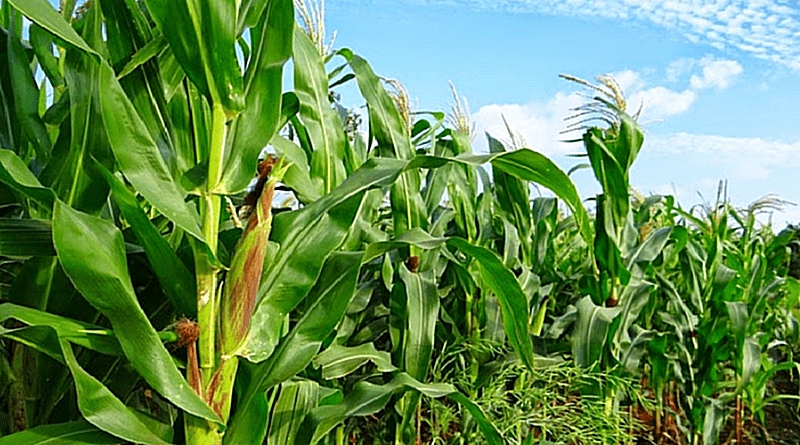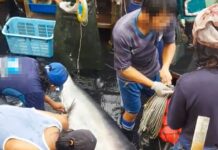By Okong’o Oduya
Busia County, Kenya: Agriculture experts in Kenya are calling upon farmers to embrace biotechnology in an effort to boost food production. It has been noted with a lot of concern that Maize production in Kenya still remains below the required amount.
It is estimated that Kenya produces 50 million bags yearly which does not meet the increasing demand for the crop in the country. To fill up the gap the government has always been forced to allow the importation of not less than 4 million bags of maize every year.
According to James Karanja from Kenya Agricultural & Livestock Research Organization (KALRO) maize demand in Kenya is increasing and production is decreasing. He said a decrease in maize production is caused by a number of challenges such as climatic changes and infestation of pests such as fall armyworms and stock borer.
“The most unfortunate thing is that the maize demanding the country is increasing but the production is decreasing. Looking this year, we expected more than 50 million bags of maize with a surplus of almost 190, 000 bags which could be of an advantage to our farmers, but this is not the case. By next year we should be prepared to import more than 4Million bags of maize.” He said.
According to him fall armyworms and stoke borer are consuming more than 25 million bags every year which amounts to billions of shillings which leads to spending other billions of money importing more maize in the county.
“And here we are talking about the stem borer and the fall armyworm. These two pests are consuming over 25 million bags. Yield losses due to stem borer amount to 4.7million bags and Fall Armyworm 23.4 million bags of maize every year. If you do the simple calculation you will realize that Kenya is losing billions of shillings importing more maize in the country,” he said.
He said that TELA project builds on the progress made from 10 years of excellent breeding work under the WEMA project. He said so far they released 76 conventional varieties of maize such as WE1101, WE3106, and WE4141 to farmers to help in boosting maize production in Kenya.
He added that the project is focused on delivering some good varieties that are resistant to pests and other diseases, saying demonstration on the varieties has proved that they have an advantage over the fall armyworm and stock borer.
“More super variety will later be introduced to the farmers, it will not only handle the issues of pests and diseases it will also address climatic challenges. The technology is there, the farmers will not need to spray their maize. What they will be required to do is practice the best agronomic practices and wait for their produce. That is the choice we are giving to the farmers,” he said.
In a forum that brought together a number of radio and print journalists in Kenya, Karanja said non-BT maize varieties only produce only 4-5 metric tons of maize per hectare which is not profitable enough to genetically modified(GM) variety.
According to him, the variety produces its natural chemical that kills any insect or pest attacking the plant which results in the production of over 8 tons per hectare. “This technology not only for the crop but also for the animal feeds,” he revealed.
He said they are working with partners such as Kenya Plant Health Inspection Services (KEPHIS) to identify regions in Kenya that are favorable for planting the maize for better yield in relation to the respective ecological zones high and low lands.
Were it not for covid-19 pandemic Karanja says, the experiments they are conducting on the variety could be ongoing, but they will have to wait a little longer to start implementing it. He hopes that by next year the government will approve the technology and authorize the variety for planting.
Karanja believes once the variety is approved, it is going to save the state billions of shillings initially used to import maize to meet the rising demand.
Karanja’s sentiments were echoed by Gladys Anyango, a maize farmer in Busia.
According to Anyango a mother of two, the new varieties will boost maize production than may it be so adding that Busia as a county has remained poor in maize production forcing them to import maize from neighboring countries.
“If the GM variety will help in increasing the production of Maize in the county, let them bring it. Busia, we depend on the neighboring country. Uganda feeds us. What we harvest here is never enough. It can’t take us to the second or third month which leaves us with no option than importing from Uganda,” she said.
Peter Rajula local farmer from Butula in Busia wanted those who are working on the variety to release their findings as soon as possible so as to embrace the farming of the crop not just for consumption but also for commercial purposes adding that currently as local farmers what they are producing is little just enough for consumption.
GM Maize variety joins other crops such as Cotton and Cassava that are produced with the use of technology to increase its production.
Cassava is also another crop that was developed with the help of technology to make it resistant to both Cassava Mosaic Disease and Cassava brown streak disease. The GM cassava is with the National Biosafety authority and it is waiting for approval by the government before it is released to the farmers for planting.
The agency determined the suitability and safety of the crops both to human beings, animals, and the environment. The agency is currently doing an assessment of the variety after public participation was conducted before its adoption by the government.
Darlington Mutetwa is from MAHYCO group says commercializing BT cotton will lead to increased cotton production in the country and in return will revive the cotton industry in Kenya adding that the country has a huge potential in cotton production.
“Kenya has got a potential of growing cotton up to 400, 000 hectares but due to one reason or another only 21, 000 hectares are used to plant cotton with ginning capacity of over 140, 000 bales of cotton but only 31 percent of the ginning capacity yearly.” He said.
BT cotton variety in Kenya was launched in March and it is still in trial fields for monitoring and soon will be distributed to farmers.















